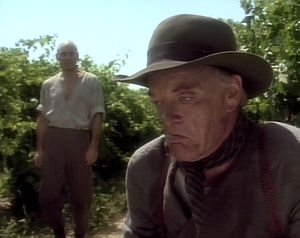| |||||||||||
| |||||||||||
|
Spoiler-free notes: This episode is arguably even more important than "The Best of Both Worlds" when it comes to understanding the storytelling of TNG and looking at the future of the Star Trek franchise. On the surface, this episode should fall victim to the soap opera trap that has plagued a handful of earlier episodes like "The Icarus Factor," episodes that sacrifice science fiction, action, and adventure in favor of strict character exploration. However, this episode succeeds where those other episodes fail, because it is absolutely essential to show that previous experiences have had a lasting impact on our characters. Picard returning home (to the most British French people I've ever seen) and being tempted by a simple life in La Barre away from existential dangers like the Borg is poignant and necessary, and when he finally breaks down and cries in front of his brother, it is deserved and heart-wrenching. Through adult eyes, I find this story much more compelling than I did before. I think anyone who leaves home and learns to face the world on his or her own terms can relate to it. Both Picard and Worf have been damaged, and both find comfort in reconnecting with their families, despite the inevitable embarassment and friction that comes with the territory. Picard's story is especially meaningful, because the writers treat him as something akin to a rape victim, somebody who has had everything he is violently ripped from him and perverted to serve the desires of an evil other. We can understand why Picard considers quitting Starfleet, even though he is slow to realize the reasons himself, and we can appreciate why Worf is embarrassed by his parents, even as we root for them to break through his tough exterior and comfort him. This episode works because the characters no longer exist in the voids of an episodic universe. In "The Icarus Factor," we don't really have strong feelings about Riker's relationship with his father, because the show at that point hasn't built any context for us to appreciate what Riker is going through. Here, though, we have been through what Picard and Worf have been through, and so we know how important it is that they reconcile with their families and find the support they need to keep going. This episode couldn't have worked in the show before now, because the show doesn't fully establish itself as multi-episodic until "The Best of Both worlds." Compare "Family" to "The Neutral Zone," for example, the episode that comes immediately after "Conspiracy." My notes for "The Neutral Zone" complain that there are no lasting effects from the previous episode, even as "The Neutral Zone" sets up the storyline that will ultimately lead to the Borg. At that time, TNG still isn't willing or able to move stories from one episode to the next. Even Yar's death doesn't have any real impact on the episode that follows it. Here, though, the writers have fully embraced a new paradigm, one that allows for new storytelling possibilites that have been heretofore unattainable. That is why "Family" is a great episode, even though it is lacking in science fiction, action, and adventure. We will see an older Picard working that same vineyard in "All Good Things..." This is the second time we've seen somebody debate the virtues of cooking over replicators, a debate that helps define Sisko's family in DS9. It's really depressing knowing that Robert and René are going to die in a fire before the events of Star Trek: Generations. I have a feeling the entire Wesley storyline is inserted into this episode because the writers are trying to wrap up his character in anticipation of his leaving the show soon. Without that explanation, it feels a little out of place and more deserving of a bigger story. | |||||||||||
|
| |||||||||||
| |||||||||||
|
Copyright ©2011 e. magill. All rights reserved.
|

